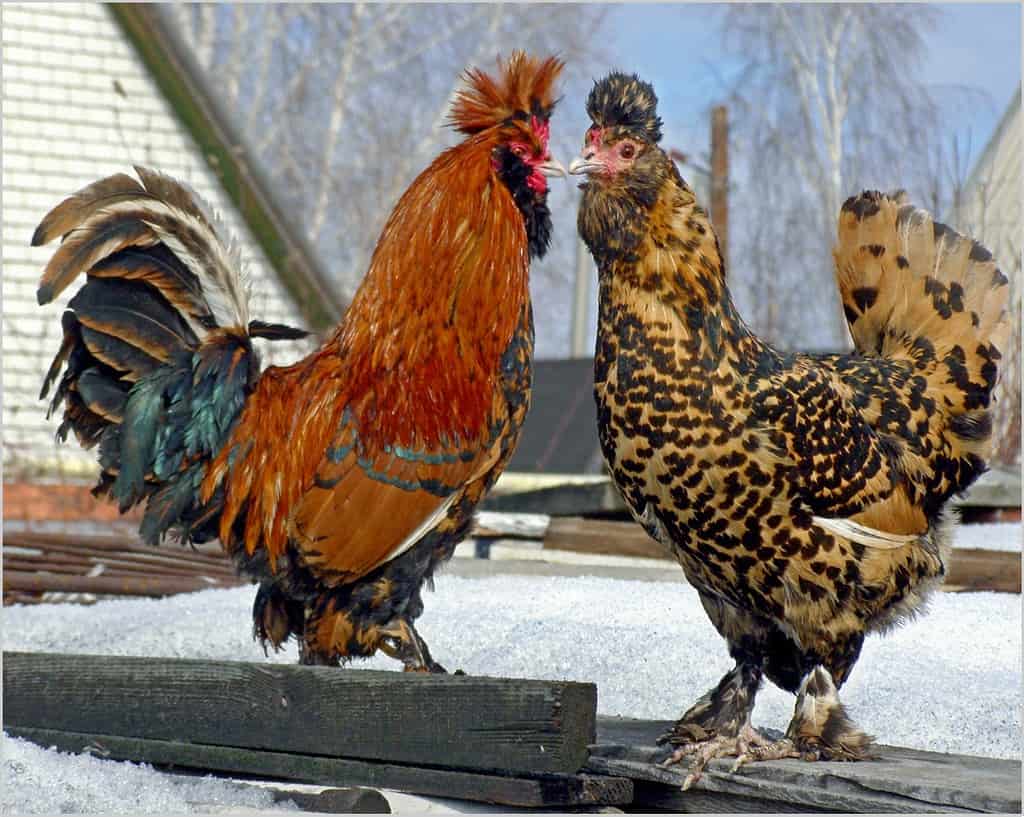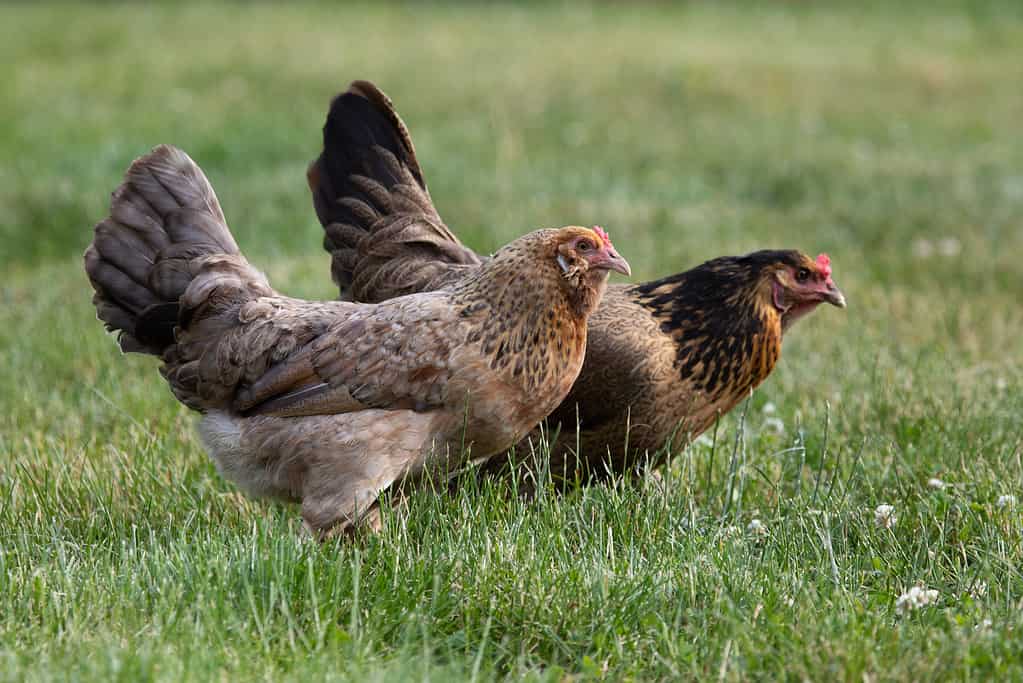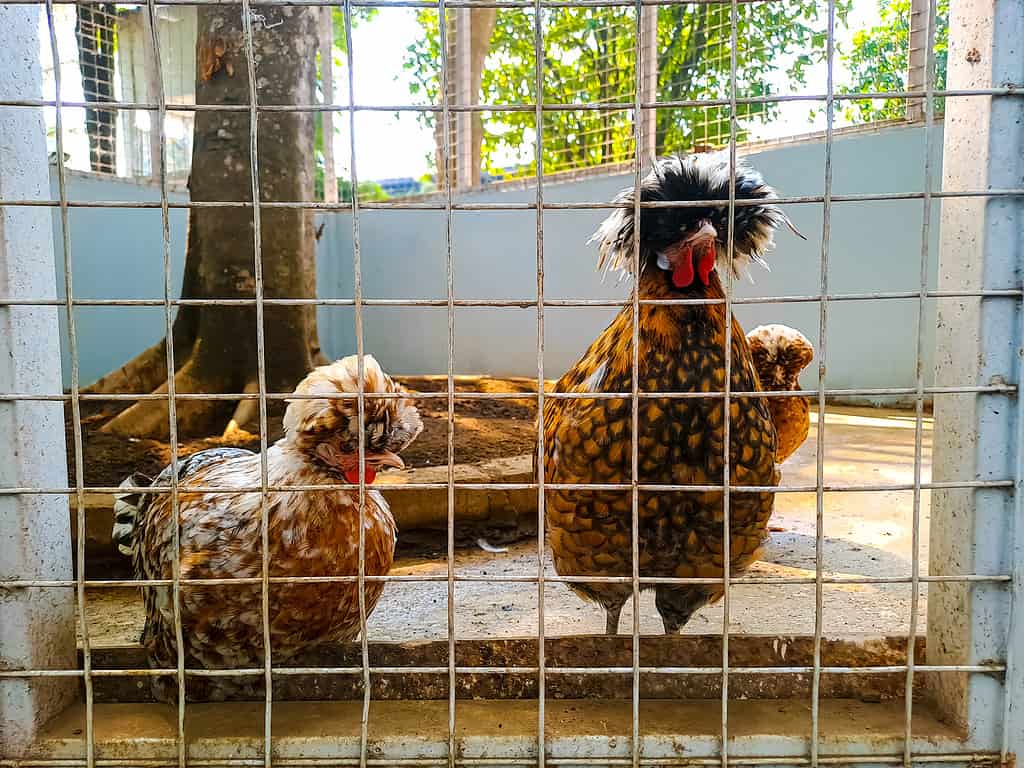According to the Centers for Disease Control and Prevention (CDC), chickens are susceptible to a number of illnesses. These include bacterial, viral, fungal, and parasitic infections. While some of these diseases are not transmissible to humans, a number of them are. Below is a list of 13 common diseases chickens carry, including five they can pass on to humans and eight they cannot.

Among other infectious bacteria, chickens carry
E. coliand
Salmonella.
©iStock.com/PeopleImages
Diseases That Are Transmissible Between Chickens and Humans
Here is a list of common diseases chickens carry that are transmissible to humans.
1. Colibacillosis (E. coli)
E. coli are bacteria that commonly occur in the intestines of people and animals. They also occur in the environment. Chickens naturally carry these bacteria, which puts people at risk of contracting E. coli either through physical contact with chickens and their environment or through eating contaminated raw meat. Although anyone can get this disease, children under the age of five, elderly people, and anyone with a weakened immune system are most at risk.
- Type of Disease: Bacterial
- Cause: Escherichia coli (E. coli)
- Transmission: Infected feces, contaminated meat, or contaminated equipment/environment
- Symptoms in chickens: Typically asymptomatic but still infectious
- Symptoms in humans: Depends on the type of E. coli and may include severe stomach cramps, diarrhea (possibly bloody), and vomiting. Additionally, E. coli may lead to eventual kidney failure, urinary tract infections, and respiratory failure.
- Treatment in chickens: Antibiotics
- Treatment in humans: No current treatment. Fluids may help alleviate symptoms.
2. Campylobacteriosis
Campylobacteriosis is a bacterial infection common to different types of poultry, including chickens. Anyone can get this disease, but children under the age of five, elderly people, and anyone with a weakened immune system are most at risk.
- Type of Disease: Bacteria
- Cause: Campylobacter spp.
- Transmission: Infected feces, contaminated meat, or contaminated equipment/environment
- Symptoms in chickens: Typically asymptomatic but still infectious
- Symptoms in humans: May include fever, stomach cramps, diarrhea (possibly bloody), nausea, and vomiting
- Treatment in chickens: Antibiotics.
- Treatment in humans: Antibiotics are not typically required. Fluids may help alleviate symptoms.
3. Salmonellosis (Salmonella)
Salmonellosis is a bacterial infection that results from handling or eating contaminated poultry, most commonly raw meat. This infection is easily transmissible to humans. Fortunately, thoroughly cooking meat is an effective way to kill salmonella bacteria in one’s food.
- Type of Disease: Bacterial
- Cause: Salmonella spp.
- Transmission: Infected meat and poultry, contaminated environment
- Symptoms in chickens: Typically asymptomatic but still infectious
- Symptoms in humans: Diarrhea, fever, stomach cramps
- Treatment in chickens: Antibiotics and bacterial cultures.
- Treatment in humans: No treatment is typically required
4. Avian Influenza (Bird Flu)

Humans do not often contract avian influenza from chickens, but it is possible.
Although it is rare for humans to contract avian influenza (bird flu) from chickens, it is possible. There are two types of AI: low pathogenic avian influenza (LPAI) and highly pathogenic avian influenza (HPAI). The former typically presents in chickens asymptomatically while the latter is associated with high avian mortality rates.
- Type of Disease: Viral
- Cause: Influenza A viruses
- Transmission: Airborne, contaminated people/chickens, contaminated environment
- Symptoms in chickens: Lethargy, decreased egg production, swelling around the neck/head/eyes, coughing/gasping/sneezing, tremors/lack of coordination, diarrhea, sudden death
- Symptoms in humans: Difficulty breathing, fever, chills, runny nose, cough, sore throat, headache, body aches, diarrhea, vomiting, red or watery eyes
- Treatment in chickens: No current treatment. Vaccines may help prevent contraction.
- Treatment in humans: Antiviral drugs
5. Favus
Among the diseases chickens carry is favus, a fungal infection that is technically transmissible between humans and chickens, though it rarely happens. Favus is also known as ringworm or white comb.
- Type of Disease: Fungal
- Cause: Microsporum gallinae
- Transmission: Contaminated people/chickens, contaminated environment
- Symptoms in chickens: Chalky deposits on comb (often progresses to white, moldy layer)
- Symptoms in humans: Scutula, alopecia
- Treatment in chickens: Antifungal drugs
- Treatment in humans: Antifungal drugs
Diseases That Are Not Transmissible Between Chickens and Humans
Here is a list of common diseases chickens carry that are not transmissible to humans.
1. Botulism

Chickens can get botulism, but they cannot transmit it to humans.
©JZHunt/ via Getty Images
Botulism is a notorious byproduct of the bacteria Clostridium botulinum. Although both humans and chickens can get this disease, each is affected by a different strain (type A and C for birds, type B for humans). Therefore, chickens do not actually give humans this disease.
- Type of Disease: Bacteria
- Cause: Clostridium botulinum
- Transmission: Decaying animal or plant matter
- Symptoms in chickens: Weakness, flaccid paralysis of legs/wings/neck, trembling, loose feathers, partially closed eyes, inability to swallow, coma
- Treatment in chickens: Antitoxin therapy
2. Mycoplasmosis (Chronic Respiratory Disease/Air Sac Syndrome)
Mycoplasmosis is a respiratory disease caused by a bacterial infection. It is not transmissible to humans, though it can cause significant respiratory issues in chicken flocks.
- Type of Disease: Bacterial
- Cause: Mycoplasma gallisepticum
- Transmission: Primarily through the egg, possibly by direct contact with infected birds
- Symptoms in chickens: Coughing, sneezing, nasal discharge
- Treatment in chickens: Antibiotics
3. Marek’s Disease
This disease is also known as fowl paralysis. Because it causes a type of cancer, treatments are very limited. Fortunately, humans cannot catch it. Unfortunately, it is highly transmissible among chickens. However, affected chickens cannot transmit it to their chicks as long as the chicks do not breathe in infected dander.
- Type of Disease: Viral
- Cause: Virus belonging to the Herpes group
- Transmission: Respiratory (breathing in infected dander or dust)
- Symptoms: May include progressive paralysis in wings/legs/neck, weight loss, anemia, difficulty breathing, diarrhea, and internal lesions and tumors
- Treatment: No current treatment. Vaccines may help prevent contraction.
4. Fowl Pox
Fowl pox is a common disease among poultry, including chickens. While it is not transmissible to humans, it is highly contagious among chickens. The best way to avoid it is by vaccinating the entire flock. Any chickens displaying symptoms should be immediately isolated.
- Type of Disease: Viral
- Cause: Viruses of the family Poxviridae and genus Avipoxvirus
- Transmission: Primarily mosquitoes; highly contagious from chicken to chicken
- Symptoms: Dry form: Crusty nodular lesions on unfeathered body parts. Wet form: Crusty nodular lesions around the mouth and discharge from the eyes
- Treatment: No current treatment (usually resolves on its own within a few weeks). Vaccines may help prevent contraction.
5. Infectious Bronchitis
Another of the diseases chickens carry is infectious bronchitis, the most contagious poultry disease in the world. This disease resists attempts to both sanitize the environment and quarantine infected individuals. In addition to this, it commonly affects the growth of chicks and egg production. However, it has no effect on humans.
- Type of Disease: Viral
- Cause: Avian coronavirus
- Transmission: Airborne, infected equipment
- Symptoms: Difficulty breathing, gasping, rales, and sneezing
- Treatment: No current treatment. Vaccines may help prevent contraction.
6. Newcastle Disease

The respiratory nervous disorder called Newcastle disease is highly contagious for chickens but not for humans.
©Andik Tri Witanto/iStock via Getty Images
Newcastle disease is highly contagious and typically affects the entire flock within a few days. This respiratory nervous disorder may appear similar to other respiratory infections. A number of different strains currently exist, some of them with the potential to be fatal. While the disease itself is not transmissible to humans, people handling infected chickens may develop conjunctivitis. This effect is short-term and usually does not require treatment.
- Type of Disease: Viral
- Cause: Avian paramyxovirus Type 1 (APVM-1) virus
- Transmission: Airborne, contaminated equipment/people/chickens
- Symptoms: Difficulty breathing, nasal discharge, murky eyes, reduction in egg production, potential twisting of the neck and/or paralysis in legs and wings
- Treatment: No current treatment. Vaccines may help prevent contraction.
7. Histoplasmosis
One of the diseases chickens carry is histoplasmosis, a fungal infection that is not transmissible between people or animals. However, any person or animal that inhales the microscopic fungal spores from the environment is at risk.
- Type of Disease: Fungal
- Cause: Histoplasma capsulatum
- Transmission: Airborne
- Symptoms in chickens: Typically asymptomatic
- Symptoms in humans: Symptoms are rare but may include fever, chills, cough, fatigue, headache, body aches, and chest pain
- Treatment in chickens: Antifungal drug and isolation
- Treatment in humans: Antifungal drug (however, most infections resolve on their own)
8. Coccidiosis
Coccidiosis is a parasitic infection in chickens that damages the gut wall. While humans can contract coccidiosis from other animals like dogs and cats, the strain affecting chickens is not known to be transmissible to people.
- Type of Disease: Parasitic
- Cause: Coccidiosis parasite (one of six species of Eimeria)
- Transmission: Infected feces, contaminated environment
- Symptoms: Loose droppings, bloody/watery diarrhea, weight loss, ruffled feathers
- Treatment: Amprolium (prevents the parasite from multiplying). Vaccines may help prevent contraction.
The photo featured at the top of this post is © Octopus16/Shutterstock.com
Thank you for reading! Have some feedback for us? Contact the AZ Animals editorial team.







